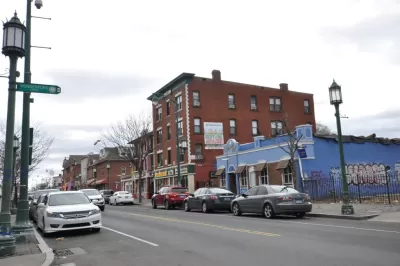The state of Connecticut deploys almost all of its federal housing funding in impoverished communities, according to this bombshell investigatory report.

Jacqueline Rabe Thomas reports from Connecticut as an example of how policy uses low-income housing tax credits to erect pockets of poverty.
"[Connecticut] officials have chosen, year after year, to direct the bulk of public funding for affordable housing to Connecticut’s most impoverished communities," writes Thomas. "Since the mid-1980s, almost $2.2 billion in low-income housing tax credits have been awarded to construct 27,000 affordable housing units in the state. Just 10% were built in prosperous towns, an investigation by The Connecticut Mirror and ProPublica has found."
Some 80 percent of that funding was spent in struggling communities in Connecticut, making it an outlier among a national average which tends toward spending low-income housing money in impoverished areas. "In a recent federal study [pdf] of 21 states, it had the second highest concentration of affordable housing in high-poverty neighborhoods, behind only Mississippi," according to Thomas.
The article traces the systematic origins of these outcomes in Connecticut (e.g., "The state requires developers to obtain local zoning approval before they even apply for a tax credit, a practice that has been flagged by federal regulators as potentially discriminatory) and also the consequences of the pattern for the residents living in subsidized housing in these low-income communities.

Planetizen Federal Action Tracker
A weekly monitor of how Trump’s orders and actions are impacting planners and planning in America.

Congressman Proposes Bill to Rename DC Metro “Trump Train”
The Make Autorail Great Again Act would withhold federal funding to the system until the Washington Metropolitan Area Transit Authority (WMATA), rebrands as the Washington Metropolitan Authority for Greater Access (WMAGA).

The Simple Legislative Tool Transforming Vacant Downtowns
In California, Michigan and Georgia, an easy win is bringing dollars — and delight — back to city centers.

The States Losing Rural Delivery Rooms at an Alarming Pace
In some states, as few as 9% of rural hospitals still deliver babies. As a result, rising pre-term births, no adequate pre-term care and "harrowing" close calls are a growing reality.

The Small South Asian Republic Going all in on EVs
Thanks to one simple policy change less than five years ago, 65% of new cars in this Himalayan country are now electric.

DC Backpedals on Bike Lane Protection, Swaps Barriers for Paint
Citing aesthetic concerns, the city is removing the concrete barriers and flexposts that once separated Arizona Avenue cyclists from motor vehicles.
Urban Design for Planners 1: Software Tools
This six-course series explores essential urban design concepts using open source software and equips planners with the tools they need to participate fully in the urban design process.
Planning for Universal Design
Learn the tools for implementing Universal Design in planning regulations.
Smith Gee Studio
City of Charlotte
City of Camden Redevelopment Agency
City of Astoria
Transportation Research & Education Center (TREC) at Portland State University
US High Speed Rail Association
City of Camden Redevelopment Agency
Municipality of Princeton (NJ)




























